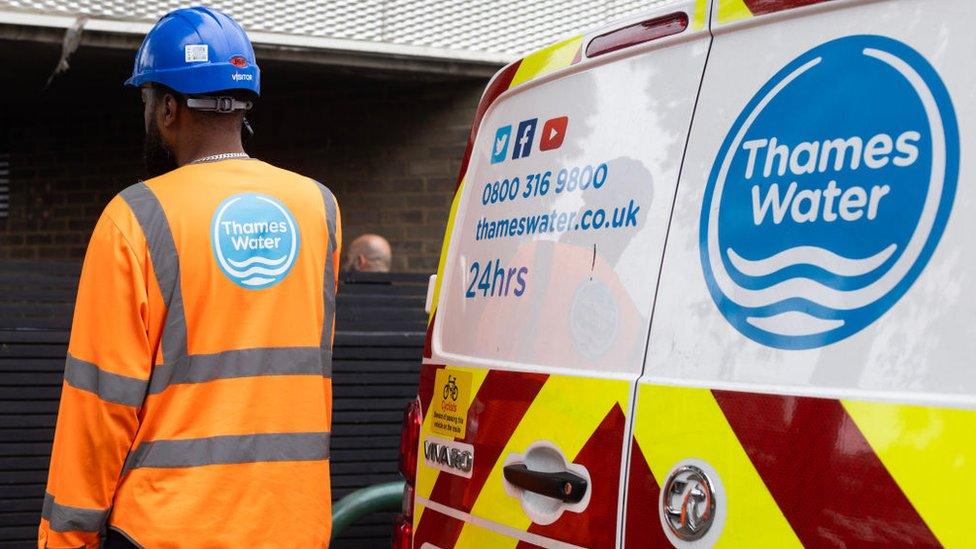Water should be a simple business - why isn't it?
- Published

In commercial terms, water should be a simple business - everyone needs to buy it for survival.
Thames Water, for example, is the monopoly supplier to a quarter of the population. It is actually impossible for another water supplier to compete. On the face of it, it is a licence to print money, a cash machine, the easiest buck around.
In economic jargon it is a natural monopoly. Unlike other privatised utilities, energy or rail, there was never any possibility of using the power of competition to raise standards. No other water supply is competing for a household's business. And the privatised companies were passed into the private sector debt-free.
Many other developed nations chose not to privatise water supply. Indeed our near-neighbours Ireland only began charging households for water within the past decade.
So something has gone badly wrong. There are floods and leaks, of cash and debt as well as water and sewage. The water companies seem to have spent more time and effort on financial engineering than actual engineering of our waste water systems.
The result is a growing public backlash against standards in the privatised water system, as bathers rebel against revolting standards in waterways and beaches. As the economist John Kenneth Galbraith wrote, it was supposed to be the Affluent Society, not the Effluent Society.
Thames Water stands out because of the high level of debt at 80% of its value, close to regulatory limits and well above other water companies. It is joint bottom of the standards league tables for leaks, sewage pollution and water treatment.
The debt is structured in a convoluted way, but what we do know is that most of it is linked to the Retail Prices Index, which is currently rising by over 11%.
Inflation should also help with the value of the assets. Thames has made great play of not paying its shareholders any dividends, but there are other methods through which they can gain returns.
The previous owners, Australian financiers Macquarie, left the company £10bn in debt (up £9bn) having extracted healthy dividends. All of this was perfectly allowed in the system, but were partly a product of that era of ultra-low interest rates.

Thames boss Sarah Bentley stepped down last week after just two years in the job
Thames' just departed chief executive Sarah Bentley told the BBC recently that the company had been "hollowed out" by "decades of underinvestment".
Now, in the absence of competition, the regulator has to do even more work to keep companies to high standards. The evidence across the privatised utilities is that regulators saw their jobs primarily as keeping bills as low as possible. There was less of an interest and expertise in the financial engineering occurring behind the curtains at headquarters.
Indeed, water companies excelled at gaming the regulations that existed to extract the most short-term profits. In 2010 the coalition government also commissioned a report that channelled water companies' complaints about Ofwat's regulatory touch being onerous.
In the short term, it worked out. Bills were kept relatively low. Shareholders made huge profits, aided by cheap refinancing at ultra-low interest rates.
Governments outsourced the blame to the private sector, and got debts off their books. Substantial investment did occur. In retrospect, it was not enough.
The biggest single investment - the Thames super sewer - was only finally pushed through, not because of British politicians, regulators or the initiative of industry, but because of the threat of repeated fines from the EU, before Brexit.
But while the water industry is a natural monopoly, it has no monopoly on nature and the environment. Vivid images of sewage pollution on beaches and in waterways are now seared into the public consciousness. This is especially politically salient among areas up for grabs in the next election. It never needed to be a hot political topic. It is now.
The potential spending on bringing the sewage and water systems up to scratch is a "how long is a piece of string?" situation. It is definitely many billions, probably tens of billions, and cases could be made for hundreds of billions.
The expectations of the public, politicians and regulators are now high. They are perhaps higher than originally envisaged by the shareholders in these companies. And yet at this moment ultra-low interest rates are gone.
The temptation for the government to act aggressively with shareholders may exist. Some tightening of the rules on dividends, with a link to environmental performance, occurred in the recent Environment Act.
But this government, or even a possible Labour government, are not just relying on the pension funds and international sovereign wealth investors to fund water infrastructure, but also energy, net zero, and housing.
It is exactly the same investors who raised eyebrows in the aftermath of the mini-budget, and three prime ministers and four chancellors in one year. This may explain some of the tiptoeing. The Labour leadership too is resisting pressure from unions on water industry nationalisation.
The alternative is public ownership which would bring all of the debts on to the exchequer, and mean the Environment Agency fining Defra for unacceptable sewage outflows. One suggestion, which could prove unpopular with the public, is to show some forgiveness to the water companies over fines. Privately, officials dismiss the idea.
For now we wait for the shareholders to decide whether to commit new funds. There is a £2bn gap between expected revenues and spending in the coming years. Shareholders may need some reassurance from regulators that prices will rise enough to justify new investments.
But what should be a simple, clean business is in need of its own cleansing treatment.

Sign up for our morning newsletter and get BBC News in your inbox.

Related topics
- Published29 June 2023


